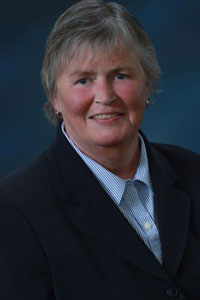In a series of profiles, we’ll introduce you to some of the Schulich School of Law’s part-time faculty members. They are casually called “downtowners” because many of the almost 70 professors who teach evening classes here are practitioners who work in downtown Halifax.
Dana-Lyn Mackenzie, the law school’s director of Student Services and Engagement, works with the downtowners on their course requirements. “We couldn’t run the law school without them,” she says.
 Paula Wedge (LLB ’84) started teaching Elder Law to upper-year students in January. This course allows students to explore the legal implications of our aging population, including elder abuse, age discrimination, financial management, personal care, and competency. The topics incorporate the consideration of relevant legislation and legal tools such as powers of attorney, living wills, trusts, wills, and representation.
Paula Wedge (LLB ’84) started teaching Elder Law to upper-year students in January. This course allows students to explore the legal implications of our aging population, including elder abuse, age discrimination, financial management, personal care, and competency. The topics incorporate the consideration of relevant legislation and legal tools such as powers of attorney, living wills, trusts, wills, and representation.
In 2008, after several years spent working in labour relations with Nova Scotia’s civil service, Wedge experienced what she describes as a “career reflection.” She saw an article in an issue of The Society Record, the Nova Scotia Barristers’ Society’s magazine, about Halifax lawyer Jeanne Desveaux, who was practicing elder law. “I thought it sounded interesting and wondered how to get into it,” she says. “Before that, I had been the executrix of my grandmother’s and my mother’s estates, which taught me the business side of elder law.”
Six years later, Wedge earned her LLM at the Schulich School of Law; her thesis was titled “Enduring Powers of Attorney and the Financial Abuse of Older Persons: Are Existing Safeguards Sufficient?” Although she is retired now, she remains involved in the Canadian Barristers’ Society’s Elder Law Section.
I’m concerned about the amount of financial abuse that older adults experience. They are an easy target for the ne’er-do-wells out there.
“I’m concerned about the amount of financial abuse that older adults experience,” says Wedge. “They get ripped off by family members using power of attorney and they’re susceptible to phone scams. They are an easy target for the ne’er-do-wells out there. If they get a good lawyer, sometimes they can recoup their losses.”
While Wedge was working on her LLM, her thesis supervisor suggested that she speak with Professor Michael Deturbide, Associate Dean, Academic, to see if there were any part-time teaching positions available. “I was interested but also hesitant because I have stage fright,” says Wedge. “You think of lawyers as eloquent advocates, but a lot of us are quivering bowls of jelly.”
One of Wedge’s mentors told her that she was going to be “brilliant,” which boosted her confidence. “As soon as I walked through the door of that first class, I jumped right in and it was like a fish to water,” she says. “All of my nervousness fell away, and I think I got better as I went through the term.”
In class, Wedge was talking to students in their mid-20s about what happens to people in their 70s and older. “I try to get them to look at situations from the point of view of the older person when they’re working on assignments, and to put themselves in that person’s shoes.”
As a lawyer, you have to use every tool in your toolbox with older clients. It’s a skill, and it’s not for everyone.
Apart from the legal knowledge she’s imparting, Wedge counsels her students to be compassionate and patient. When they’re making appointments with older clients, she advises them to be conscious of mobility and accessibility issues, among other factors. For example, can they get to the washroom easily? Is the lighting adequate so they can read the documents? Are the chairs supportive enough?
“If the client is hard of hearing, it’s important that you speak slowly but not in a condescending way,” says Wedge. “They may be older and have a hard time remembering things, but they are still human beings and should be treated with respect. As a lawyer, you have to use every tool in your toolbox with older clients. It’s a skill, and it’s not for everyone.”
Wedge will be teaching Elder Law again in the winter, plus Labour Law in the fall. “I’m looking forward to it,” she says. “The students ask good questions, which makes me think and teaches me that I have much more to learn.”
Recent News
- The Schulich School of Law ft in "Top 10 Law Schools in Canada in 2024"
- Professor Emeritus Wayne MacKay ft in "'Enough is enough': N.S. Teachers Union prepared to strike if no progress on 'priority areas'"
- Professor Emeritus Wayne MacKay ft in "Livestreamed transphobic assault in Hamilton shows why Canada must be tougher on hate, expert says"
- Assistant Professor Suzie Dunn ft in "'Ground is shifting' for social media giants, says federal justice minister pushing Online Harms Act"
- Professor Emeritus Wayne MacKay ft in "Maritime Noon Phone‑In: Three experts discuss and answer questions about proposed legislation in NB called the Compassionate Intervention Act"
- Professor Emeritus Wayne MacKay ft in "Social media giants face scrutiny for cyberbullying. How does this affect Islanders?"
- The Schulich School of Law ft in "The Best Law Schools In Canada 2024"
- Professor Emeritus Wayne MacKay ft in "The Todd Veinotte Show, April 4, 2024"
